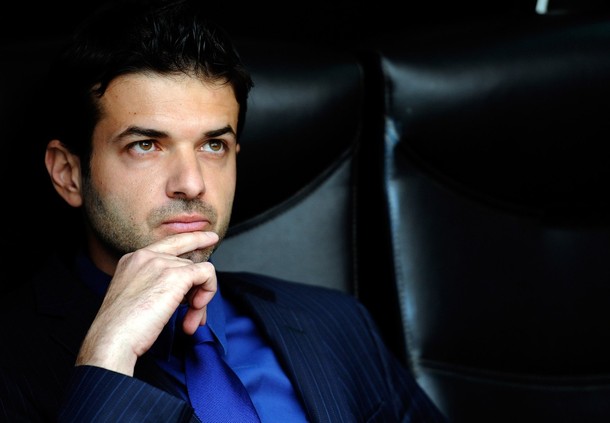Just three months ago, Inter fans could have been forgiven for failing to see any sort of light at the end of the tunnel. Manager Claudio Ranieri was about to be fired following a disastrous run of one win in 10 matches. Thus, a miserable patch in the club’s long history, which could be aptly described as the post-Mourinho hangover, looked set to continue.
After Jose Mourinho’s historic treble in 2009/10, the Nerazzurri had experienced a shocking start to the season under Rafael Benitez, who was replaced after Leonardo after just six months. His successor managed to get the club back on the right path, finishing second in the league (albeit with some embarrassing Champions League defeats), but was whisked off to become director of football at Paris Saint-Germain. In came Gian Piero Gasperini, whose failed 3-4-3 formation saw him axed after three league games. That is how Ranieri, a tactician respected for stabilising teams in crisis, came to be appointed.
His failure only goes to show that the problem in the blue and black half of Milan has not been who is in charge – it has been the squad at their disposal. More or less the same side that triumphed in Europe two years ago is now past its peak - in both defence and midfield, the loss of pace has proven catastrophic, and superb forward Samuel Eto’o has now moved to Anzhi Makhachkala. More worrying, though, was the seeming lack of young prospects ready to fill the veterans’ boots: Davide Santon, Mattia Destro and, more understandably, Mario Balotelli’s sale looked to have shorn i Serpenti of young guns.
However, it is now apparent that there is yet hope for Inter. On the 26th March, as Ranieri was relieved of his duties, Andrea Stramaccioni was appointed in his place. Stramaccioni had won the final of the inaugural NextGen series, hailed as the youth version of the Champions League, just the day before. In the nine league games from his appointment to the end of the 2011/12 season, Inter won four matches (including the 4-2 Derby della Madonnina victory which mathematically confirmed rivals Milan as losers of the Scudetto), drawing two and losing three. The Nerazzurri finished in sixth place in the standings – hardly respectable for a club of such stature – but Stramaccioni had brought about some stability, and now looks the man to build the Nerazzurri’s future.
There are three main reasons to believe that the man compared with Jose Mourinho is a better bet than any other to lead Inter back to glory.
First of all, his record and tactical nous at youth level look very impressive. After winning two national titles while working in the youth coaching staff at Roma, he was given the job of manager of the Inter Primavera team (the highest stage of the youth system) last year. Under his guidance, Inter progressed to the final of the NextGen series, wherein they came up against a skilful Ajax side that had despatched Barcelona and Liverpool, 3-0 and 6-0 respectively, with their flowing football. However, Stramaccioni compensated for his players’ slight technical inferiority by holding a solid, defensive shape and breaking on the counter-attack. Ajax’s Danish top scorer Viktor Fischer’s threat was blunted by the sturdy backline, and the threat of forwards Samuele Longo and Daniel Bessa, aided by Lorenzo Crisetig’s midfield passes and right-back Simone Pecorini’s pacy forward runs. With the teams inseparable at 1-1 after extra-time, Inter showed the greater character to win the penalty shoot-out.
The second reason is Stramaccioni’s rapport with the players. His similarity with Mourinho is not just tactical: his team and he share a strong bond. When Inter scored during the last few games of the season, the scorer would often run straight to the bench to pay tribute to the 36-year-old tactician, and star trequartista Wesley Sneijder has given his support, saying ‘I think he is the best Inter coach after Mourinho’.
Thirdly, nobody is better placed to start to build an Inter for the future. It is not true to say that they have not spent time and money on young players, but those players have not shown their full promise, as of yet. The potential within Joel Obi, for example, is evident, but there has been criticism that he has been played in the wrong position – out on the wing – where his final ball has let him down.
Not only does Stramaccioni seemingly have the skulls to get the most out of such players already in the senior squad – he can also take the youngsters from his former Primavera side, when they are ready, and find a role for them within the team.
Granted, there are a lot of what-ifs. One worry is that Massimo Moratti will lose patience and sack the 36-year-old before things can really get going. Moratti remains a trigger-happy president, and it is extremely rare for Inter managers to last more than two years. Stramaccioni’s Inter will not bring instant success. Short-term ambitions may be restricted to regaining a place in the top 3. But after five years, if left undisturbed, Stramaccioni may just have developed the core of his Primavera side into the backbone of a rejuvenated Inter with silverware aspirations.









































